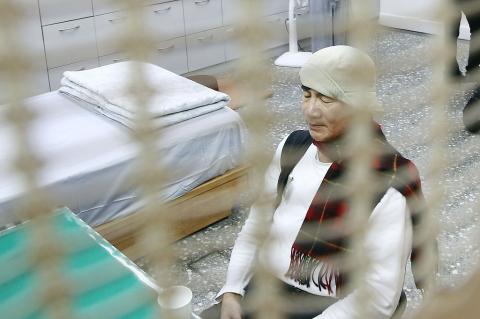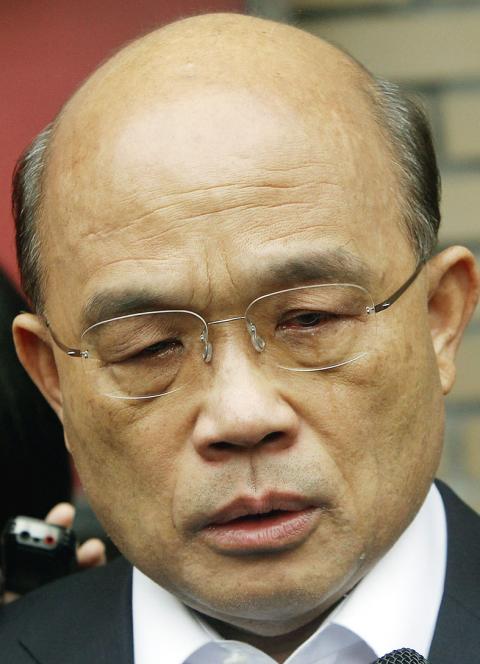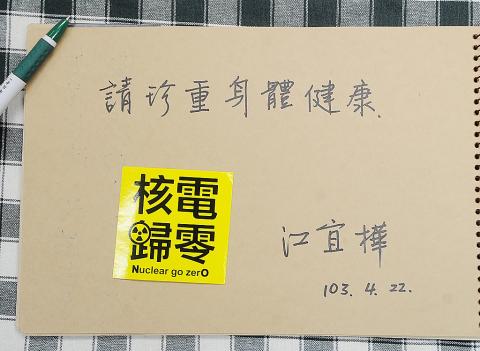Former Democratic Progressive Party (DPP) chairman Lin I-hsiung (林義雄) yesterday began a hunger strike at Taipei’s Gikong Presbyterian Church to demand that the government halt the construction of the Fourth Nuclear Power Plant in New Taipei City’s Gongliao District (貢寮), saying that the President Ma Ying-jeou (馬英九) administration’s pledge that the plant would be safe was “a trick to fool the public.”
“So-called nuclear safety is questionable because even if the plant was completed and became operational, unassailable damage could still take place in the event of a natural disaster or human error,” Lin said.
“My mind is at peace because I’m about to do something meaningful and helpful for Taiwan,” the 73-year-old said after arriving at the church at 10:55am, about an hour later than scheduled.

Photo: CNA
Lin, who announced his fasting campaign last week, is staging the hunger strike at the site of the Lin family’s former residence, where his mother and twin daughters were murdered on Feb. 28, 1980, by an unknown assailant. His eldest daughter, then nine years old, survived the attack and the Lin home was eventually converted into a church.
Lin — a well-known anti-nuclear advocate — said he appreciated his wife and daughter supporting him, despite knowing that they are doing so with “a heavy heart.”
After delivering an opening statement and conducting a 20-minute question-and-answer session with the media, Lin attended a brief prayer ceremony with friends before entering a renovated corner of the church that used to be the living room of his family residence to start the hunger strike.

Photo: Fang Pin-chao, Taipei Times
The staunch anti-nuclear advocate has vowed to neither eat, speak to nor meet visitors during his indefinite one-man protest.
Asked if he would end the hunger strike if the DPP-proposed special statute on the incomplete Gongliao station — which would lower the national referendum threshold to a simple majority and set a clear question for a plebiscite on completing the plant — was adopted, Lin said he would welcome such a development, but “it has not happened yet.”
Lin’s protest is drawing increasing attention from political figures, with DPP Chairman Su Tseng-chang (蘇貞昌) and Premier Jiang Yi-huah (江宜樺) both visiting the church.

Photo: Fang Pin-chao, Taipei Times
Su and Jiang’s visits came a day after they met on Monday to discuss the statute, but failed to reach a consensus, with the premier saying the plan was unfeasible.
Su arrived at the church at 12pm and wrote a message in a notebook prepared by church staff, saying afterward that he had been “racing against time” to resolve the issue so Lin’s hunger strike would be unnecessary, but had failed to reach an accord with the government.
“I’m not sure how many days Mr Lin will be able to sustain [the hunger strike.] After four decades of struggle [with the nuclear issue], what more can we do?” Su said as tears fell on his cheeks.
Jiang arrived about 10 minutes later to loud protests from Lin’s supporters outside the church, who chanted: “Jiang Yi-huah step down” and “Stop the construction of the Fourth Nuclear Power Plant,” and was again heckled when he left.
The premier also wrote a message to Lin in the notebook, saying: “Please take care of your health,” before leaving quickly without speaking to the media.
The Executive Yuan’s information office said Jiang was representing Ma on the visit to express the president’s concern about Lin’s health.
Given Lin’s age, his health could be at risk just two days into the fast, said National Taiwan University physician Ko Wen-je (柯文哲), who is also an independent aspirant in the Taipei mayoral election.
Former DPP chairperson Tsai Ing-wen (蔡英文) also visited Lin, arriving at the church in the afternoon and reiterating on Facebook the party’s determination to stop the construction of the Gongliao plant.
Former president Lee Teng-hui (李登輝) — a supporter of nuclear energy — yesterday said he was saddened by Lin’s protest, urging the Ma administration to “listen to the public” and work on new nuclear technology to erase people’s doubts about the project’s safety.
The Chilin Foundation, founded by Lin, and the Taiwan Rangers have organized events near the church every night starting yesterday as vigils for him. Similar activities are also planned in Taoyuan, Greater Taichung, Chiayi, Greater Tainan and Greater Kaohsiung.

INVESTIGATION: The case is the latest instance of a DPP figure being implicated in an espionage network accused of allegedly leaking information to Chinese intelligence Democratic Progressive Party (DPP) member Ho Jen-chieh (何仁傑) was detained and held incommunicado yesterday on suspicion of spying for China during his tenure as assistant to then-minister of foreign affairs Joseph Wu (吳釗燮). The Taipei District Prosecutors’ Office said Ho was implicated during its investigation into alleged spying activities by former Presidential Office consultant Wu Shang-yu (吳尚雨). Prosecutors said there is reason to believe Ho breached the National Security Act (國家安全法) by leaking classified Ministry of Foreign Affairs information to Chinese intelligence. Following interrogation, prosecutors petitioned the Taipei District Court to detain Ho, citing concerns over potential collusion or tampering of evidence. The

Seventy percent of middle and elementary schools now conduct English classes entirely in English, the Ministry of Education said, as it encourages schools nationwide to adopt this practice Minister of Education (MOE) Cheng Ying-yao (鄭英耀) is scheduled to present a report on the government’s bilingual education policy to the Legislative Yuan’s Education and Culture Committee today. The report would outline strategies aimed at expanding access to education, reducing regional disparities and improving talent cultivation. Implementation of bilingual education policies has varied across local governments, occasionally drawing public criticism. For example, some schools have required teachers of non-English subjects to pass English proficiency

‘FORM OF PROTEST’: The German Institute Taipei said it was ‘shocked’ to see Nazi symbolism used in connection with political aims as it condemned the incident Sung Chien-liang (宋建樑), who led efforts to recall Democratic Progressive Party (DPP) Legislator Lee Kun-cheng (李坤城), was released on bail of NT$80,000 yesterday amid an outcry over a Nazi armband he wore to questioning the night before. Sung arrived at the New Taipei City District Prosecutors’ Office for questioning in a recall petition forgery case on Tuesday night wearing a red armband bearing a swastika, carrying a copy of Adolf Hitler’s Mein Kampf and giving a Nazi salute. Sung left the building at 1:15am without the armband and apparently covering the book with a coat. This is a serious international scandal and Chinese

NEGOTIATIONS: The US response to the countermeasures and plans Taiwan presented has been positive, including boosting procurement and investment, the president said Taiwan is included in the first group for trade negotiations with the US, President William Lai (賴清德) said yesterday, as he seeks to shield Taiwanese exporters from a 32 percent tariff. In Washington, US Trade Representative Jamieson Greer said in an interview on Fox News on Thursday that he would speak to his Taiwanese and Israeli counterparts yesterday about tariffs after holding a long discussion with the Vietnamese earlier. US President Donald Trump on Wednesday postponed punishing levies on multiple trade partners, including Taiwan, for three months after trillions of US dollars were wiped off global markets. He has maintained a 10 percent